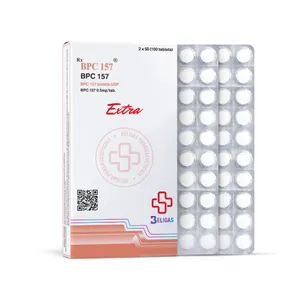
Exploring the Benefits and Risks of Human Growth Hormone Therapy
TABLE OF CONTENTS
Human Growth Hormone (HGH) is a peptide hormone that plays a crucial role in various bodily functions, including growth, metabolism, and muscle development. Produced by the pituitary gland, HGH is essential for the growth of bones and tissues while also influencing carbohydrate metabolism. As we age, the natural production of HGH decreases, leading to a myriad of physiological changes that can impact overall health and well-being.
What is Human Growth Hormone?
HGH is a hormone that stimulates growth, cell reproduction, and cell regeneration in humans. It is composed of 191 amino acids and is secreted by the anterior pituitary gland. In children and adolescents, HGH is crucial for physical growth. In adults, it helps maintain normal body structure and metabolism, which includes body fluid homeostasis, sugar and fat metabolism, and muscle growth.
Functions of HGH
The functions of HGH are numerous and include:
- Growth Stimulation: In children and adolescents, HGH promotes growth and development by stimulating the growth of bones and cartilage.
- Metabolism Regulation: HGH plays a role in regulating the body’s metabolism, influencing how the body utilizes fats and carbohydrates.
- Muscle Mass Increase: HGH contributes to increases in muscle mass by promoting protein synthesis and muscle cell regeneration.
- Fat Reduction: It aids in reducing fat storage by promoting the use of body fat as a source of energy.
- Bone Health: HGH is essential for maintaining bone density and overall skeletal health.
The Growth Hormone Deficiency
Growth Hormone Deficiency (GHD) can occur in children and adults. In children, it can lead to short stature and delayed growth. In adults, GHD can manifest as increased body fat, decreased muscle mass, fatigue, and even psychological effects such as low self-esteem and depression. Treating GHD typically involves HGH replacement therapy, which can help mitigate these symptoms and improve quality of life.
HGH Therapy
HGH therapy has become popular not only for treating GHD but also for anti-aging purposes and athletic enhancement. However, it is crucial to understand the implications of HGH therapy, including potential side effects and legality concerns.
Benefits of HGH Therapy
Many individuals have reported various benefits from HGH therapy, including:
- Enhanced muscle strength and performance.
- Improvement in exercise capacity.
- Reduction in body fat.
- Improved skin tone and elasticity.
- Enhanced recovery from injuries.
Risks and Side Effects
Despite its benefits, HGH therapy is not without risks. Some of the side effects may include:
- Joint and muscle pain.
- Increased insulin resistance, which can lead to diabetes.
- Swelling from fluid retention.
- Carpal tunnel syndrome.
- Risk of tumors in those who have a history of cancer.
Therefore, individuals should consult healthcare professionals before considering HGH therapy, particularly if they have underlying health conditions.
Legality and Regulation
The use of HGH is regulated in many countries, and in the United States, it is classified as a controlled substance. While it is approved for use in specific medical conditions, it is illegal to use HGH for anti-aging or performance enhancement without a prescription. The misuse of HGH can lead to severe legal repercussions and health risks.
Who Might Use HGH?
Some of the groups who might consider HGH therapy include:
- Individuals diagnosed with GHD.
- Athletes seeking to enhance performance, though this is illegal and against the rules of most sports organizations.
- Individuals seeking anti-aging treatments.
Alternative Approaches
For those looking to enhance muscle growth, reduce fat, or improve athletic performance without resorting to HGH, there are several alternatives, including:
- A well-balanced diet rich in proteins and healthy fats.
- A regular exercise routine focused on strength training.
- Natural supplements that support growth hormone levels, such as amino acids and vitamins.
Natural methods of promoting HGH production may include effective lifestyle choices like improving sleep quality and managing stress levels.
User Experiences and Testimonials
Many users claim to have experienced significant improvements in energy levels, muscle mass, and overall body composition after starting HGH therapy. However, these experiences can vary widely from person to person. It is crucial to approach testimonials with caution, as they may not represent the average experience.
Conclusion
Human Growth Hormone is a vital hormone that affects many aspects of health and well-being. While HGH therapy can provide benefits in certain medical cases, its use should be approached cautiously due to the risk of side effects and legal implications. Individuals interested in HGH therapy should consult healthcare professionals and consider other natural methods to help support their health and fitness goals.
FAQs
What is HGH used for?
HGH is used for treating growth hormone deficiencies and certain medical conditions. Some people also use it for anti-aging and performance enhancement, although this is illegal without a prescription.
Is HGH safe to use?
While HGH can be safe when prescribed by a healthcare professional for specific conditions, misuse can lead to serious health risks.
Can I increase my HGH levels naturally?
Yes, natural methods such as maintaining a healthy diet, regular exercise, proper sleep, and managing stress can help enhance HGH production.
Are there side effects of HGH therapy?
Yes. Some side effects may include joint pain, insulin resistance, and fluid retention.
Where can I find more information about HGH?
For additional information, you can visit the following links:
FREE SHIPPING
CLICK HERE!
HOT PROMOTIONS!
Human Growth Hormone (HGH) is a peptide hormone that plays a vital role in growth, development, metabolism, and overall health in humans. Produced by the pituitary gland, HGH stimulates growth in childhood and adolescence, promoting the development of bones, muscles, and tissues. Its secretion peaks during adolescence and gradually declines with age. This decline can lead to several age-related issues, including decreased muscle mass, increased body fat, and lower energy levels. As a result, HGH has garnered significant attention for its potential therapeutic uses and as a controversial anti-aging treatment.
In addition to its critical role in growth and development, HGH is involved in various metabolic processes. It helps regulate body composition by promoting the synthesis of proteins and aiding in the breakdown of fats, thus influencing overall energy levels. HGH also plays a role in the regulation of glucose levels, impacting how the body uses insulin. These metabolic functions make HGH an essential player in maintaining a balanced and healthy body, particularly during the aging process when metabolism typically slows down.
The medical applications of HGH have expanded over the years, primarily focusing on treating growth hormone deficiencies in children and adults. Conditions such as Turner syndrome, Prader-Willi syndrome, and chronic kidney disease may warrant HGH therapy to support normal growth and development. In adults, HGH therapy has been used to address issues like muscle wasting associated with HIV/AIDS and certain pituitary disorders. While these uses are well-established, the off-label use of HGH for anti-aging and performance enhancement has raised ethical concerns and warrant a closer examination of its potential risks and benefits.
The popularity of HGH in sports and bodybuilding communities is partly due to its reputation as a performance-enhancing substance. Athletes and bodybuilders seek HGH for its purported effects on muscle growth, fat reduction, and recovery times. However, the use of HGH in sports is prohibited by most athletic organizations, and its effectiveness as a performance enhancer remains debated. Additionally, the misuse of HGH can lead to significant side effects, including joint and muscle pain, swelling, insulin resistance, and an increased risk of certain diseases, highlighting the need for careful consideration and medical supervision.
In summary, Human Growth Hormone is a critical hormone with significant implications for growth, metabolism, and overall health. While its medical uses in treating specific deficiencies are well-established, the allure of HGH for anti-aging and athletic enhancement raises ethical and health considerations. As research continues to explore the nuances of HGH and its effects, individuals must approach the hormone with caution and a discerning understanding of its potential benefits and risks. Being informed is essential, as the landscape of HGH use continues to evolve in both medical and non-medical contexts.
















